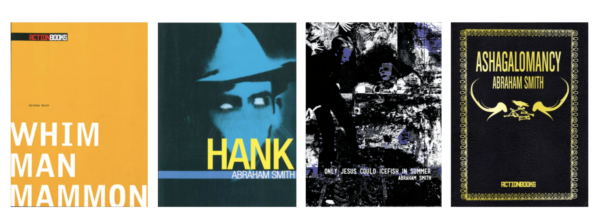
Paul Cunningham: Action Books published your debut poetry collection—Whim Man Mammon—in 2007. What can you tell us about how this book came into being?
Abraham Smith: Gave a reading at Notre Dame. Joyelle and Johannes gave me a call while I scuttled between airports for my connector flight back to NYC where I’d gone for a year to feel miserable working at Sotheby’s. First while the phone rang I thought, well, I left a toothbrush. Then while the phone rang I looked down and said, no, I didn’t forget my boots. They said they’d like to publish a book. They changed my life.

PC: Action Books published three more collections: Hank (2010), Only Jesus Could Icefish in Summer (2014), and Ashagalomancy (2015). Third Man Books put out Destruction of Man in 2018. How do you see these books in conversations with one another? Or would it make more sense to think of each book as a different song?
AS: Townes said one song leads to the next such that when you start to sense the wee whiskers tendriling betwixt songs why you can easily daisychain one after another and sing yourself to death by thirst. I think so too. Poetry for me is knowing that one eyeball is experience and one eyeball is innocence and your throat is leased to a sandhill crane until 2092.
PC: Do you revisit your older work before beginning a new project?
AS: Nope.
PC: Your latest title is a sizable chapbook from New Michigan Press called Bear Lite Inn. You’ve described these as some of your oldest poems, ones you wrote over a decade ago. Poems that you just couldn’t ignore (like carpenter bees?) Why did you feel you needed to revisit these poems?
AS: Yes those old poems, mainly 20 years old, I don’t know, they kept feeling believable. Redeemable. Like you take the bottles back to recycle the glass and they say, no—take the empties home and keep foghorning on ’em. Like fog got tired and hired to be pocketcloth, I don’t know, they stay(ed) close. And I was glad to add here and there little patches of shellac. And am so grateful to Ander Monson for sailing the whole sloop into the world.
PC: How have you and The Snarlin’ Yarns been holding up during these pandemical times? How did the virtual tour go? Break Your Heart is such a great album (I’m partial to “DWI”—also obsessed with the music video). Is there talk of anything new on the horizon?
AS: Thanks so much! We practice twice a week. I wake up in the night singing along to my dear friend bandmates’ songs. I have a few too. We’ll record one anyway of those: Triggers & Chains. It’s a gospel shout meditation upon our infernalforever American gun tragedy. We are slated to record record #2 over the last 3 days of June–there again in MS at Dial Back Sound with Matt Patton of the Drive-By Truckers and Bronson Tew of the Squirrel Nut Zippers. We are counting down the shivering seconds until.
PC: Who are you currently reading?
AS: Looks like a late winter chipmunk mash by my bedside of books. Hard to pare that down. But let’s see. Always: Will Alexander. Lately: Bohumil Hrabal a lot. Mark Wunderlich. Thoreau. Kilvert’s journals. Rankine’s Just Us. Some Levertov. Beresford-Kroeger’s To Speak for the Trees. A great record out on the Field Works series called Cedars. Featuring Marisa Anderson among many other luminaries. And on and on. Tons of relistening to my personal co-poet-laureates of Planet Troubadour: Charlie Parr and Courtney Marie Andrews.
PC: What advice would you give to emerging poets?
AS: Community over hunger for beyond. Should folks identify your abiding misstep—keep making it until it’s a dancecraze.

Abraham Smith is the author of four collections from Action Books—and most recently, the chapbook Bear Lite Inn (New Michigan Press, 2020) and the full-length Destruction of Man (Third Man Books, 2018). Away from his desk, he improvises poems inside songs with his band the Snarlin’ Yarns; their debut record Break Your Heart was released on Dial Back Sound in Fall 2020. He lives in Ogden, Utah, where he is Assistant Professor of English and Co-Director of Creative Writing at Weber State University.